Tonebase – Catching the Magic Moment
Interview with tonebase’s piano executive Ben Laude
In late 2019, tonebase Piano was launched, with the aim of giving amateur pianists access to high level music education through premium online content featuring great artists. Since then, education has been trending even more in a digital direction because of the pandemic. Piano Street’s Patrick Jovell has talked to Ben Laude about the challenges he faced building tonebase’s piano platform, but also about how to forge a unified music education, reconciling our physical and virtual realities.
Piano Street: Dear Ben, thank you for letting us interview you! From what I know you are responsible for the piano at tonebase. But you are not alone. I could count fifteen people working in your team. Among the founders I find Chris Garwood who is a guitarist. Can you tell me how it all started and how it has developed?
Ben Laude: First of all, thank you Patrick and to everyone at Piano Street for the resources you’ve been providing us pianists for decades now! I used to frequent the forums back in my conservatory days, mostly looking to pick fights with people about whose Rach 3 recording was the greatest (it was Horowitz and Reiner from 1951, I was convinced).
I joined tonebase in medias res about two years ago with a simple mandate: build the piano platform. The model I had at the time was tonebase’s original pilot classical guitar platform, which had been launched in 2017. Our three founders met at Yale, where two of them (Chris Garwood and Igor Lichtmann) were pursuing their master’s in guitar. They took their ‘Music and Business’ course more seriously than most, it seems, and ended up with a germ of a business plan. They connected with a comp-sci/econ double major whiz kid (Abhi Nayar), and the three of them officially founded tonebase in the summer of 2017. Their savvy and initial success led to getting involved with some Silicon Valley investors, with whom they secured funding to expand to another instrument. Piano was the obvious choice.
At the time I was hired, I was busy teaching and performing, and continued to assist David Dubal in curating his NYC piano performance series (a gig I had going back to my early grad work at Juilliard). I figured it was time to put the doctorate I earned in piano to proper use, and had started applying to tenure-track jobs in higher ed when the call for a tonebase ‘Head of Piano’ fell into my lap. It seemed a bit too good to be true, as I’ve had a second passion for media production dating back to high school, especially video editing. I’ve always enjoyed Bruno Mosaingeon’s interviews at the piano with Glenn Gould and wished more films like this existed with more pianists.
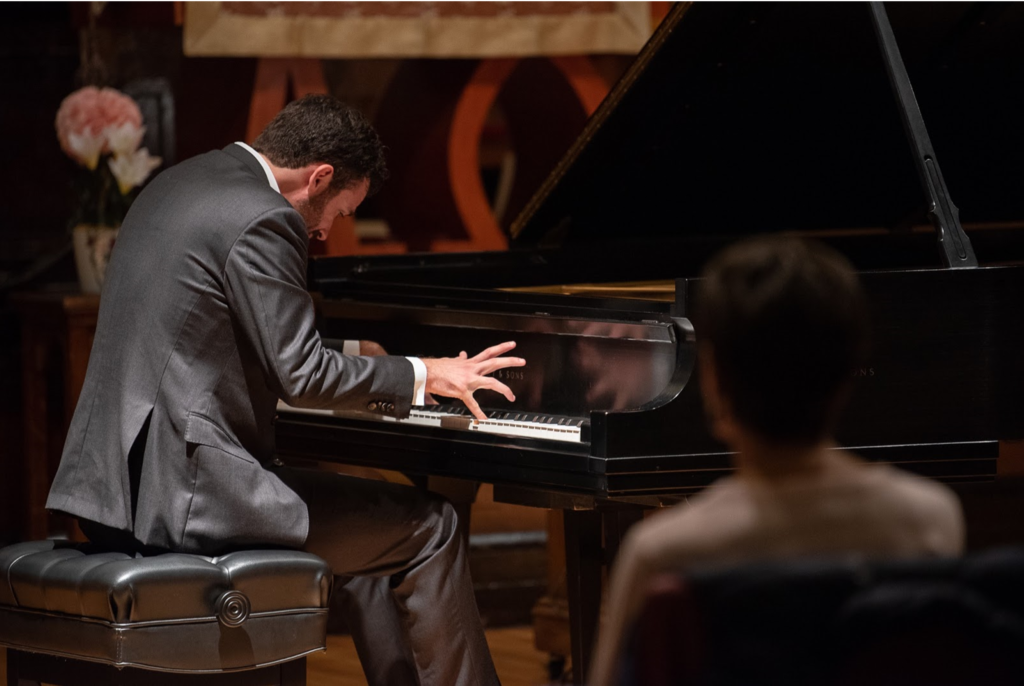
Ben Laude performing in concert
My first six months at tonebase were a mad scramble to recruit as many high calibre pianists and professors as I could and coordinate productions on various repertoire and pianistic topics. Garrick Ohlsson was one of the first major artists to say ‘yes’ – he and I met for coffee in New York the summer of 2019 and got lost in conversation about piano. He was clearly a great fit for our longform style of in-depth tutorial videos, and I owe a lot to him for being willing to contribute lessons to our launch. The next big challenge was organizing our post-production workflow with my teammates – editing the video and adding corresponding scores and workbooks to the platform. (I watched Ohlsson teach Chopin’s First Ballade and Third Scherzo over and over again for so many hours while editing those lessons, that I must have learned both pieces by osmosis – they’re now in my active repertoire and I can’t account for that based on practice-time alone.) We launched in late 2019 with about 30 videos and to-date we’re approaching 300 released, plus dozens more in our backlog waiting to be processed and released.
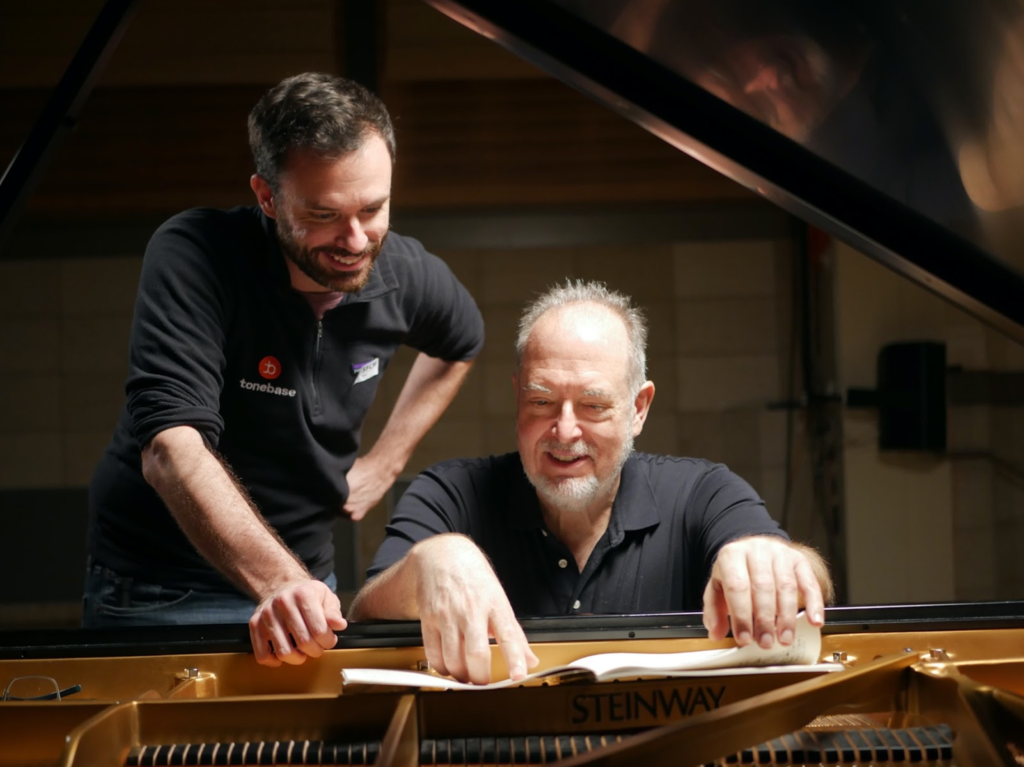
Garrick Ohlsson preparing for filming momentum.
2020 was a bittersweet. It started off in January and February with some unforgettable productions, including two extended sessions with Leon Fleisher, just months before he passed. While Covid led to a higher demand for streaming services, it also became quite difficult to continue productions as before. I also began to direct my energies towards developing foundational musicianship content, beginner courses, and live programming, while continuing to pursue new collaborations with great concert artists and professors where possible. 2021 couldn’t have arrived soon enough. Our subscriber count has by now risen to over 5000; among our active users, about 40% are ‘serious amateurs’, 40% teachers/professionals, and another 20% or so younger students. We’re aiming to keep pace with our expanding base as we grow, and continue to provide a really exceptional and unique product to pianists of very different backgrounds. There’s also some major concert artists who will be added to our roster soon, including a few based in the UK/EU, and I look forward to producing with them later this year (hopefully in person, fingers crossed). We’re still a young platform, and I’m excited to see where we can go from here.
PS:You are a Juilliard trained pianist and you also function as a tutor, also on tonebase. Which key questions on piano playing and interpretation have you nourished through the years and which come out in your function as a Masterclass moderator?
BL: While at Juilliard I grew fascinated by one of the core questions, or mysteries, of piano playing: that is, what is the relation between physical technique and musical expression. The more I investigated the problem, the more I discovered that musicianship training – i.e., deeply internalizing musical relationships in one’s mind, ear, and voice – can foster better interpretive ideas while also contributing directly to overcoming physical obstacles. In my tonebase lessons, I’ve tried to emphasize the importance of integrating music theory and aural skills into our practice at the keyboard, and we’ve been releasing more and more practical musicianship content for our users’ benefit.
These musicianship subjects are often taught in isolation, especially in the American conservatory systems I’m familiar with, so that your typical piano major will sleep through music theory class on Monday, mumble through solfege exercises on Tuesday, and show up on Wednesday for a private lesson. This results in an unfortunate separation between the intellectual comprehension of harmony and form, the aural recognition of musical relationships, and the physical realization of these principles in performance. (I should also mention a vital fourth element, the study of music history and culture, which takes place on Thursday and is forgotten about by the weekend!) It is no wonder why so many one-sided musicians have emerged from this state of affairs. How often have we encountered a pianist with “great technique, but nothing to say” or with “great ideas, but no chops,” or those who have great ears or analytical minds but never applied them at the piano?
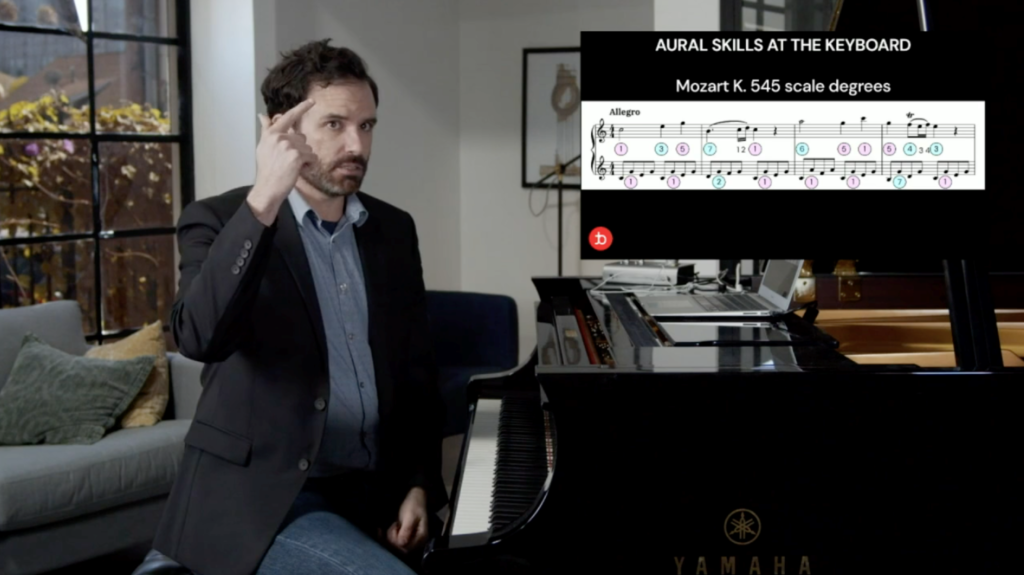
Producer and tutor. Ben Laude is also featured in instruction videos at tonebase.
The remedy, I have found, is a kind of well-rounded musicianship training where playing the piano is treated as a means for developing your musical personality, rather than as an end in itself. I don’t claim to know the best way to get there! But, I have familiarized myself with some traditions that I believe can help a great deal – for one, I’ve always found Nadia Boulanger’s method of keyboard skills training, with solfege and harmonic analysis mixed in, to be very useful. (The first time I ever performed Bach without a memory slip came after painstakingly working through the Fugue phrase-by-phrase, singing one voice while playing the others, then switching.) Committing to such training transforms our connection to the instrument, and over time a kind of holistic awareness starts to develop, which is just awesome. It becomes nearly impossible to play a given figuration or progression on the piano without hearing its component elements and knowing something about how they relate. Scores can be processed faster and memorization becomes much more rapid and reliable. Furthermore, these new sensitivities instantly inform how passages might be played, conjuring all sorts of possibilities about voicing, texture, phrasing, rubato, etc. Physically, the instrument begins feeling more like an extension of your arm, hand, and fingers, relieving tension and promoting facility.
There’s much more to this, but these are the basic contours of a kind of “musical fluency” at the keyboard that I believe all pianists should develop more thoroughly (including myself!), and which I hope to spread through tonebase.
PS: The line-up of artists and pedagogues on tonebase is impressive as are the productions in question. The technology used is a proof of your ambition to give the viewer the best possible chance to get into the contents of the Masterclasses. One easily thinks about carefully directed momenta in order to secure the core message. As a “stage director”, how do you manage the different artists and personalities which all have their own fields of expertise and own articulated artistic/pedagogical universes?
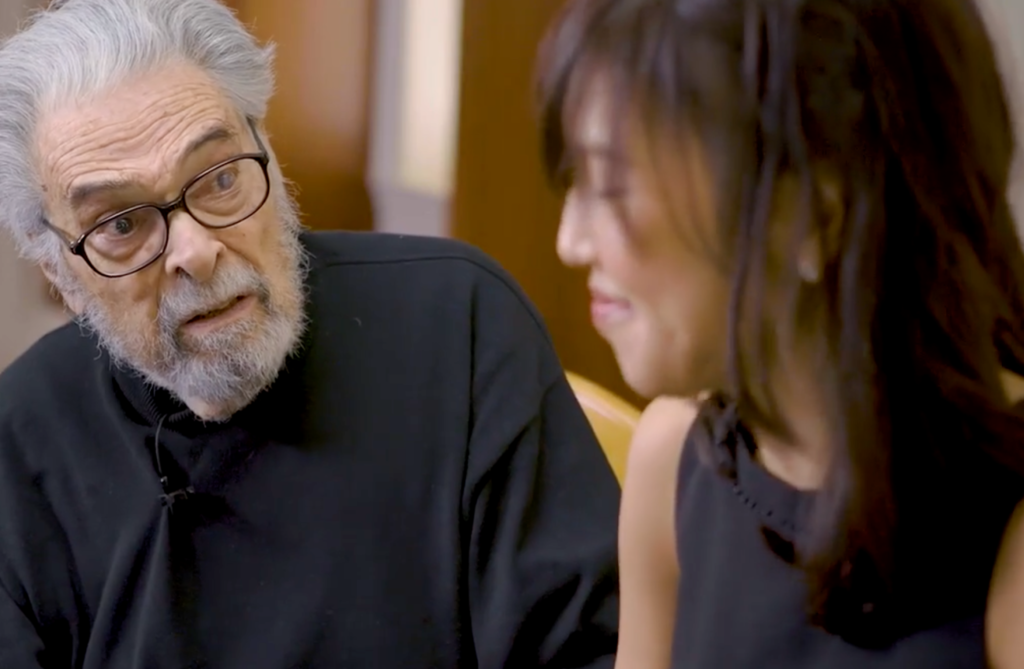
Leon Fleisher teaching pianist Rachel Naomi Kudo Brahms’ B-flat major Piano Concerto.
BL: Pianists can be temperamental, particular people, and each of the artists on tonebase has a singular vision at the instrument that has been honed over decades. I’m lucky to work with one pianist at a time, since their perspectives often rub against each other. In some cases, they appear to be in direct opposition. For example, Leon Fleisher preached a rhythmically-strict, architectural approach to building phrases; Jerome Lowenthal insisted on a rhythmically flexible, narrative approach to interpretation. Who is right? Both, and neither, I suppose. What matters to me is that both have the floor, and are given a platform to demonstrate and defend their perspectives at the instrument. Then, it’s up to viewers to watch, absorb, and find what resonates with them. Pianistic wisdom comes in many varieties, sometimes contradictory!
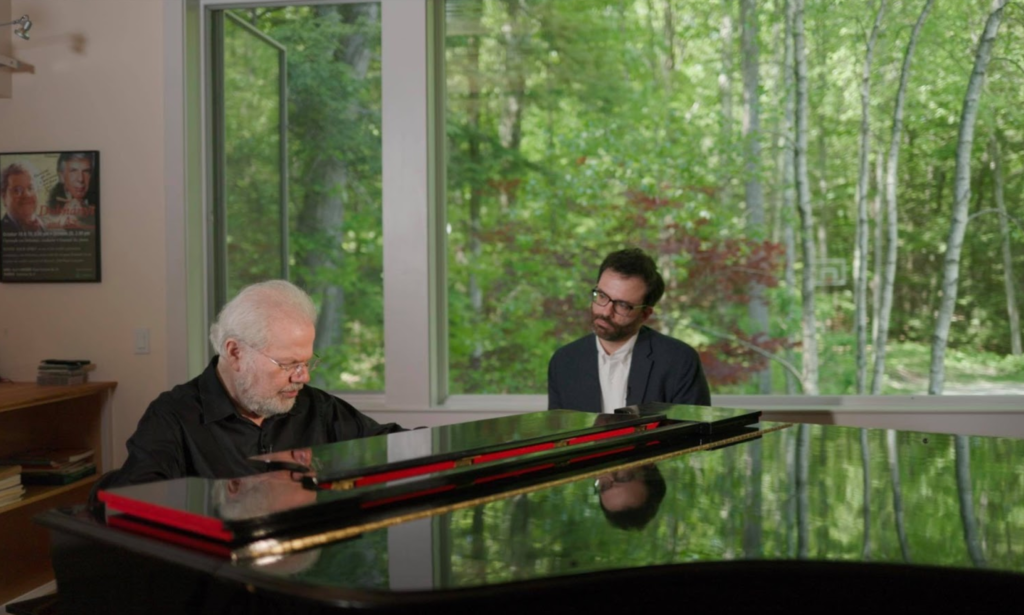
Ben Laude in interview and Chopin session with Emanuel Ax.
In terms of stage direction, I do my best to steer and structure lessons without leaving my fingerprints all over them. Some artists, like Boris Berman, preferred to work more carefully with me in advance to develop a carefully articulated lesson plan. In other cases, artists were more comfortable speaking extemporaneously about their piece or topic. Garrick Ohlsson, for example, had a marvelous ability to spontaneously manifest highly structured lessons on the spot with very few retakes. One of the trickiest parts of the job has to do with building an ideal viewer in the mind of the artist. Professors are used to the give and take of engaging directly with a student in person, so speaking to an anonymous future student inside a camera can be alienating. If I can manage to make artists comfortable and be themselves, they forget about the artificial environment they’re in and their personalities shine through.
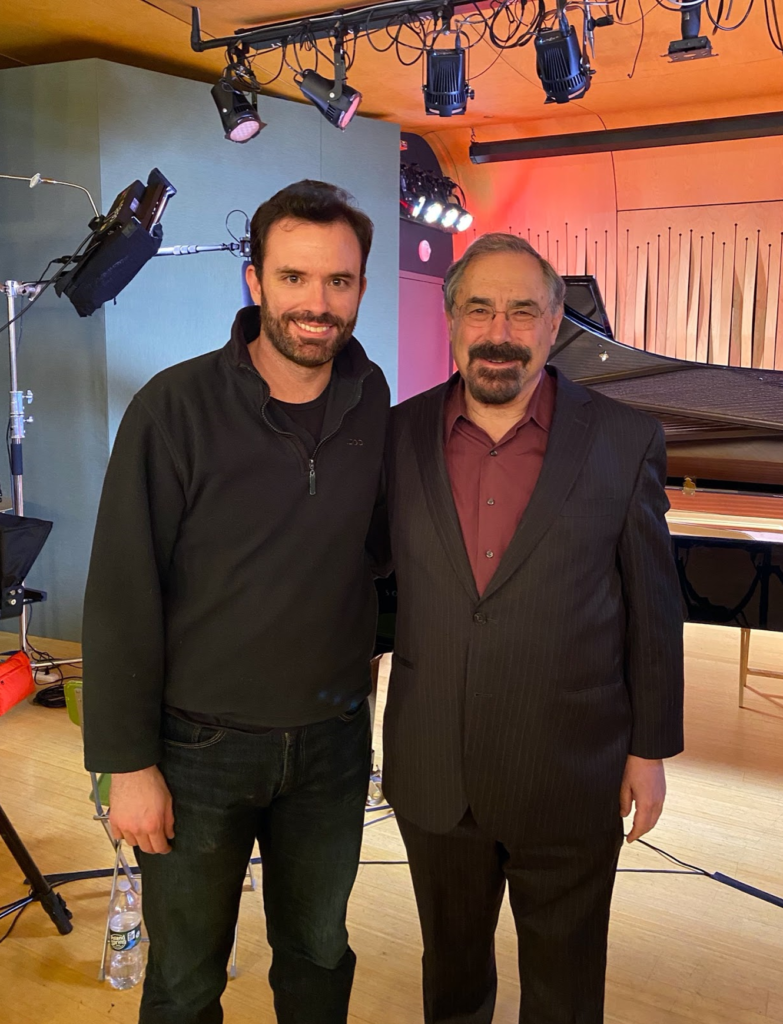
After filming session series with Boris Berman.
PS: This last year’s Pandemic situation has shown a necessary increase in consulting digital resources in music education. Institutions are now much more open to include such alternatives in their regular curricula. How do you predict the future for tonebase and similar resources on the Internet?
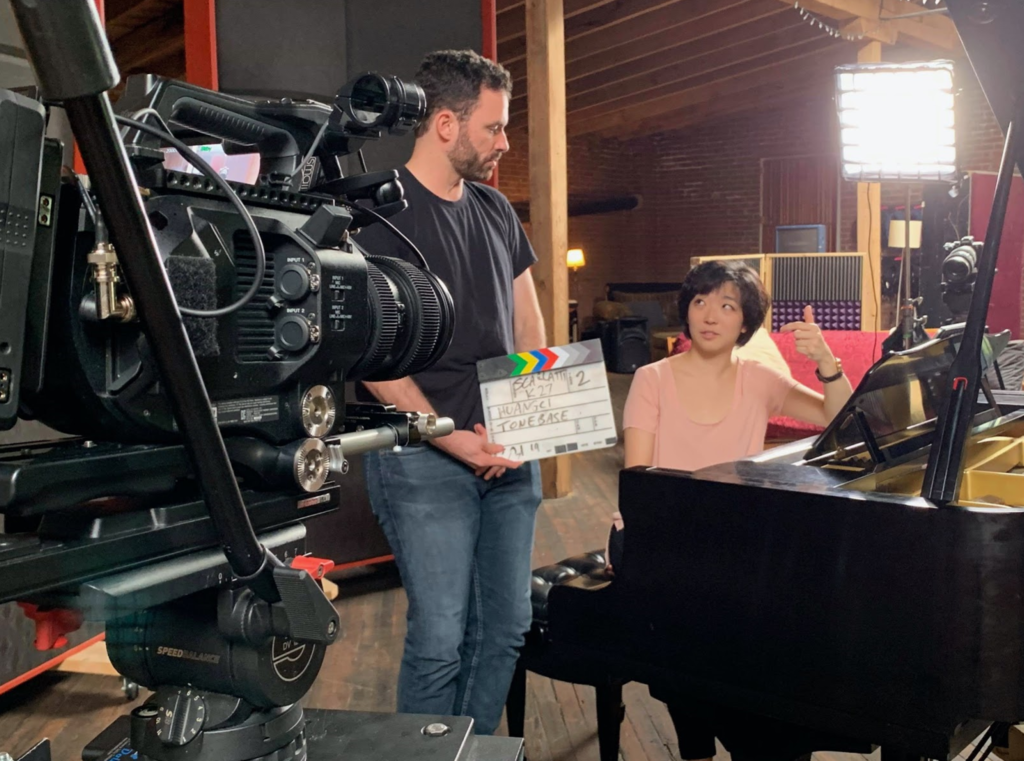
One of the Scarlatti takes with Claire Huangci.
BL: I should say that I’m familiar enough with dystopian literature and film to be suspicious of the rallying cry to thoroughly digitize education. It has seemed inevitable since the advent of the internet and streaming services, but brick and mortar educational institutions were too thoroughly entrenched in social life to be uprooted like Blockbuster Video. Nevertheless, education had been trending in a digital direction when 2020 arrived. It seems like the pandemic just sped things up by a decade.
The original mission of tonebase was about connecting amateur pianists to the otherwise insulated worlds of conservatory and concert hall. Therefore it relied on the coexistence, and separation, between offline institutions and online individuals. The amateur’s relative isolation from centers of high level music making and education was the problem we were solving by making the wisdom of great artists accessible and affordable. But what we found even before the pandemic was a widespread general interest in such premium online video content, from more amateurs on the periphery to professionals at the center of these institutions, plus many students and teachers in between. Now that the pandemic has created a situation in which everyone is isolated, including from their own institutions, there has been a need for virtual experiences of all kinds. Some are surrogates that will disappear once social restrictions are lifted, but it seems like others are here to stay. I see lots of potential for tonebase and other online resources to become staples of music education in the post-Covid future, both in institutional settings and private teaching.
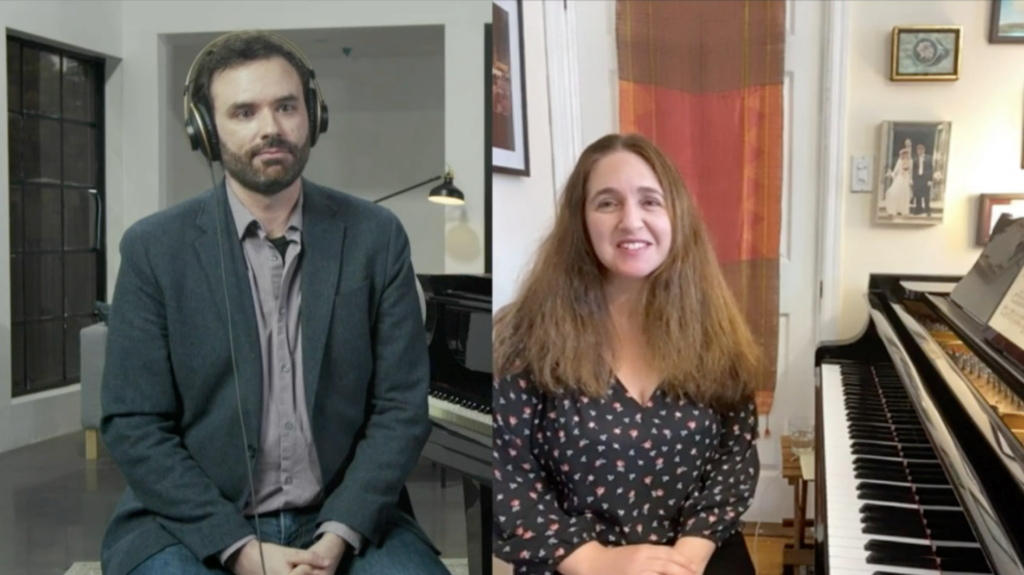
Screen capture from a digital workshop with Simone Dinnerstein.
You might think a subjective, sensuous discipline like music requires the flexibility of “offline” learning and would find less use in incorporating digital resources into the classroom or studio. Yet what I’ve found in observing tonebase’s appeal is that it’s precisely the elusiveness of music education that increases the value of any given artist’s video lessons. Whereas it might be interesting to hear the same calculus concept explained by five different math instructors, ultimately they’re each trying to communicate the same bit of knowledge. This is never quite the case with piano instructors, as there’s a wonderful lack of consensus about even fundamental principles of technique and interpretation. There are no axiomatic proofs to musical understanding or scientific laws to piano technique, there are only more-or-less-successful approaches developed and passed down through lineages of mentorship. Under the right circumstances, piano teachers should embrace this healthy relativism and utilize our video archive as discussion material during lessons. Having students weigh different approaches will help them think critically about piano playing, find solutions faster, and ultimately foster original artistry to a degree not possible if you only had access to the perspectives of one or two professors.
On the other hand, often the point of a lesson is not to encourage an exploration of different viewpoints, but to focus on solving a student’s specific problems without the distractions of a second opinion. Even here, a digital resource like tonebase offers a lot of promise down the road. Private teachers often wonder what goes on during the 167 hours between lessons with a student, and having trusted, high quality video lessons and training videos available for the student to watch and practice along with could be a game changer. Teachers could be spending valuable lesson time working on the particular problems a student is facing while they entrust tonebase’s virtual instructors to do the job of introducing or reinforcing concepts and skills in the interim. Along these lines, I believe piano departments and music school libraries will find great value in making tonebase available to both students and faculty as a versatile teaching and training resource.
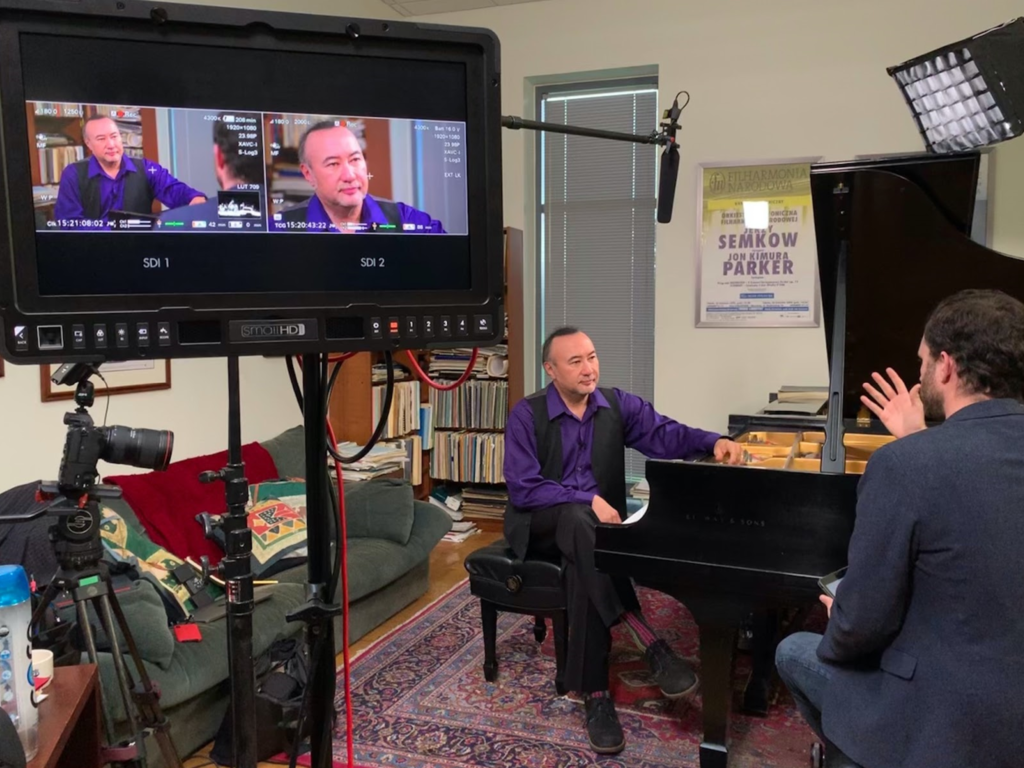
Discussing the piano concerto repertoire with Jon Kimura Parker.
Of course, in-person learning environments bring benefits that can’t or shouldn’t be reproduced by digital technologies, such as direct feedback from instructors and social interaction with peers. Music, as Boris Berman exclaims in a tonebase lesson, is “the art of sound,” and there’s something irreplaceable about experiencing sonic vibrations in person – making, sharing, and commenting on music together in the same space. Feedback can be digitally mediated to a degree, and tonebase has been increasing its live workshops and developing community feedback channels. But ultimately, the power of digital resources utilized in combination with in-person instruction remains unrealized, especially in music. The goal is to make tonebase a constructive force in reconciling our physical and virtual realities and forging a unified music education that draws from the best of both worlds. (And if all hell breaks loose and the machines do try to take over, I would expect the humanizing forces of music education to tame the robots and for tonebase to help keep our priorities straight!)
Emanuel Ax on Learning Chopin in Lockdown
tonebase recently visited the 7-time GRAMMY Award-winning pianist at his breathtaking home in the Berkshires for an extended interview and recording session.
Comments
Really nice discussion/interview and hope that the lockdown yields some new creativity! Gary
I have seen so many ads from tonebase and have somehow felt sceptical despite the many big names. I like hearing the thoughts of this person you are interviewing. I can see I was wrong and it is good to connect the amateur with the world of classical. There is something about ads that seems somehow “commercial” that turned me off. I wonder how they could advertise without YouTube ads? Or maybe different ads?
Tonebase is a wonderful service that I use sometimes :) I loved this insight into the creation of it.
Wonderful resource, tonebase is. Thanks for shining a spotlight on it. Did you know Leon Fleisher – that eminent artist who lost the use of his right hand fingers! – contributed videos to the service before he died?
Really enjoyed this long read and getting to feel like I was a part of something special. I am a new reader here but I plan to stick around. Fantastic work, truly!
Excellent interview with Ben Laude. As a lifetime subscriber to tonebase, I can tell you it is worth every penny in terms of quality and content, as well as delivery. They continue to launch new services at new charge, including the ability to forward a video of your playing in order to receive commentary and feedback. It is a serious site dedicated to serious artists wishing to bring out the best in themselves for the enjoyment and betterment of everyone. Thank you!
Anyone mention Amadeus? Same kind of “piano” as Ripleys Game, some kind of harpsichord I think…I know this, thinking…thinking…
I really like what Tonebase offers but unfortunately if you are a beginner, you will have to wait until you arrive at least at the intermediate stage.